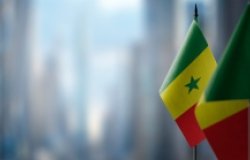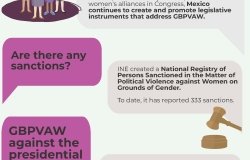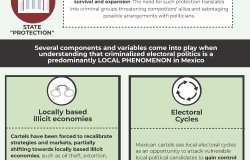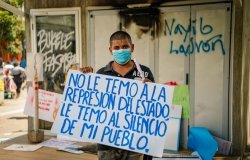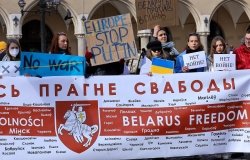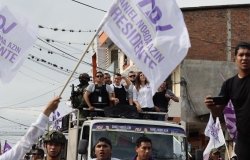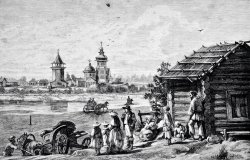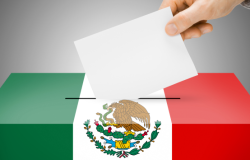Turmoil in Tunisia Two Years Later
The second anniversary of Tunisia’s Jasmine Revolution reflected the deepening political divisions across the North African country. Five different political factions—two Islamist and three secular parties—took to the street of Tunis on January 14 to mark the ouster of former President Zine al Abidine Ben Ali. They had starkly different messages.
The second anniversary of Tunisia’s Jasmine Revolution reflected the deepening political divisions across the North African country. Five different political factions—two Islamist and three secular parties—took to the street of Tunis on January 14 to mark the ouster of former President Zine al Abidine Ben Ali. They had starkly different messages.
Thousands of opposition demonstrators called for “a new revolution” to oust the government. In protests along Habib Bourguiba Avenue, site of the 2011 uprising, they carried banners declaring “No to emerging dictatorship. No to religious dictatorship.” Others chanted “Ennahda out” and “Where is the constitution? Where is democracy?”
In contrast, government supporters and allies held street celebrations of the revolution, which included sermons and religious music, near the ancient Casbah. The government is a coalition led by the Islamist Ennahda Party allied with two secular parties.
Reflecting the political chasm, Islamist students from the Leagues for the Protection of the Revolution hauled down and stomped on a flag belonging to the secular Call of Tunisia Party.
Tensions also flared outside of the capital. On the eve of the anniversary, Tunisia’s army deployed troops in Ben Guardane, a town near the Libyan border after protestors demanding better living conditions torched a police station. Senior government officials acknowledged problems, but said they were optimistic about prospects for economic growth.
On the anniversary, Prime Minister Hamadi Jebali signed a “social pact” with unions and business executives designed to spur growth. It pledged to improve infrastructure, provide professional training, and crack down on illegal trading and smuggling.
Tunisians leaders on both sides of the political spectrum also used the occasion to address security concerns—this time in agreement. Both sides warned about the growing challenge from religious vigilantes. In an anniversary speech, former Prime Minister Beji Caid Essebsi, leader of the new opposition Call of Tunisia Party, warned citizens about the threat from ultraconservative Salafis who have rioted outside art exhibits and harassed unveiled women and alcohol sellers. Salafis were also blamed for the storming of the U.S. Embassy in September.
In his anniversary speech, Ennahda lead Rachid Ghannouchi cited the dangers of religious extremism. He expressed concern that the revolution could turn into “chaos.” Jihadists have also posed a rising threat to Tunisian security. In December, security forces arrested members of a terrorist cell connected to Al Qaeda.
The following are comments by Tunisian leaders from the previous week.
Rachid Ghannouchi, Ennahda party leader
“Tunisians are for the first time the true protagonists of their history, and are engaged in an experience that will be a model for democracy in the region. Its success will require creative solutions to the many challenges facing us: managing the explosion of social and political demands after decades of repression; establishing a rule of law that guarantees equality, and individual liberties in the face of resistance from the previous regime; building a national consensus without neutralizing politics; and constructing a development model that ensures prosperity for all the country's regions. I am confident Tunisians can bravely face these challenges just as they stood collectively against dictatorship.”
“The government is seeking to remedy this through targeted development projects. However, only around half of these projects have been realised, due to the weakness of our infrastructure. Similarly, the high graduate unemployment requires structural reform, since the problem results from a mismatch between the educational system and the job market. The government has managed some remarkable achievements – including a 3.25% growth rate and reduction in unemployment – but the solutions to many pressing demands can only be found in long-term structural change.” January 13 in an op-ed for The Guardian
“We do not want Tunisia to become like Somalia, where revolution turned into chaos.” January 11 anniversary speech
President Moncef Marzouki, Congress for the Republic party
“Tunisia is divided into two parts: a modernist part and another part which is directing Tunisia towards Taliban-ism. This division is threatening the modernist and moderate Islamic lifestyles… No one would date to eliminate modernism and moderate Islam.”
“The constitution is a priority now in order to get out of the abyss, yet National Constituent Assembly members wasted a large amount of time in judging ministers and in their successive absences… Determining an election date depends on the constitutional draft. So, this is the responsibility of all parties to assume their responsibilities and forget about their differences and personal interests.”
“It is high time that the government solve the problem of high prices, which is related to the issue of smuggling, and deal with the phenomena of violence, which are threatening the security and safety of Tunisians today.” January 13 in an interview with state television and Al Wataniya radio station
“Today, Tunisians are citizens. Tunisians are no longer afraid of the police, they are no longer afraid of the government…Tunisians have freedom of expression, freedom of association, freedom to protest.”
“Either you oppose them [conservatives], and you have civil war, cold or hot, or you take a different attitude, which is what mine has been. We need to make of a complex Tunisia a unique reality; we need to bring people together to talk… We are on the path to achieving a consensus that is unique in the Arab world.” January 12 in an interview with France 24
Beji Caid Essebsi, Call of Tunisia party Leader
“It is the [Tunisian] flag, which represents everyone. But some want to replace it with another, the black flag [of the Salafists]. The people must remain vigilant because there is a threat.” January 14 anniversary speech
Prime Minister Hamadi Jebali, Ennahda party
“Strengthening the human rights system, protecting the interests of all production sides, avoiding hiding the real social and economic situation and breaking with political instrumentalization aimed at serving narrow interests, are the major orientations of the Government.”
“The Government is committed to enhance the participation of all political parties and representatives of the civil society to improve the political climate and achieve national concord… [The government] does not always claim to find adequate and immediate solutions to problems posed.” January 14 statement to the National Constituent Assembly
Selma Elloumi Rekik, Call of Tunisia party
“We are not against the Islamists, but they don't represent all Tunisians, nor the country's history of being a crossroads of many cultures and civilizations… We felt there needed to be an equilibrium [after Ennahda succeeded in parliamentary elections], otherwise we would no longer be in a democratic transition…[Our party aims] to bring together Tunisia’s democratic forces.” January 14 in an interview with The Guardian
Zied Adhari, Ennahda party assembly member
“A democratic transition is a fragile thing. If you are a businessman, and you built your fortune thanks to the old regime, Ben Ali has gone but you are still there with your money. You can still finance groups that are against the revolution. You could fund protests, problems, disturbances, even election campaigns. So we need a way of neutralizing elements who were closely linked to the old regime. They can't reinvent themselves as democrats overnight.” January 14 in an interview with The Guardian
Seyyed Ferjani, Ennahda party member
“The reality is that in one year or so, you can't change much. And experience is lacking in some fields ... when you have a bad bureaucracy like this, you have to know how to navigate it. Some ministers were good, and some weren't up to it.” January 13 in an interview with The National
Related Program

The Islamists
Learn more about Hamas and how it relates to similarly aligned organizations throughout the region. Read more
